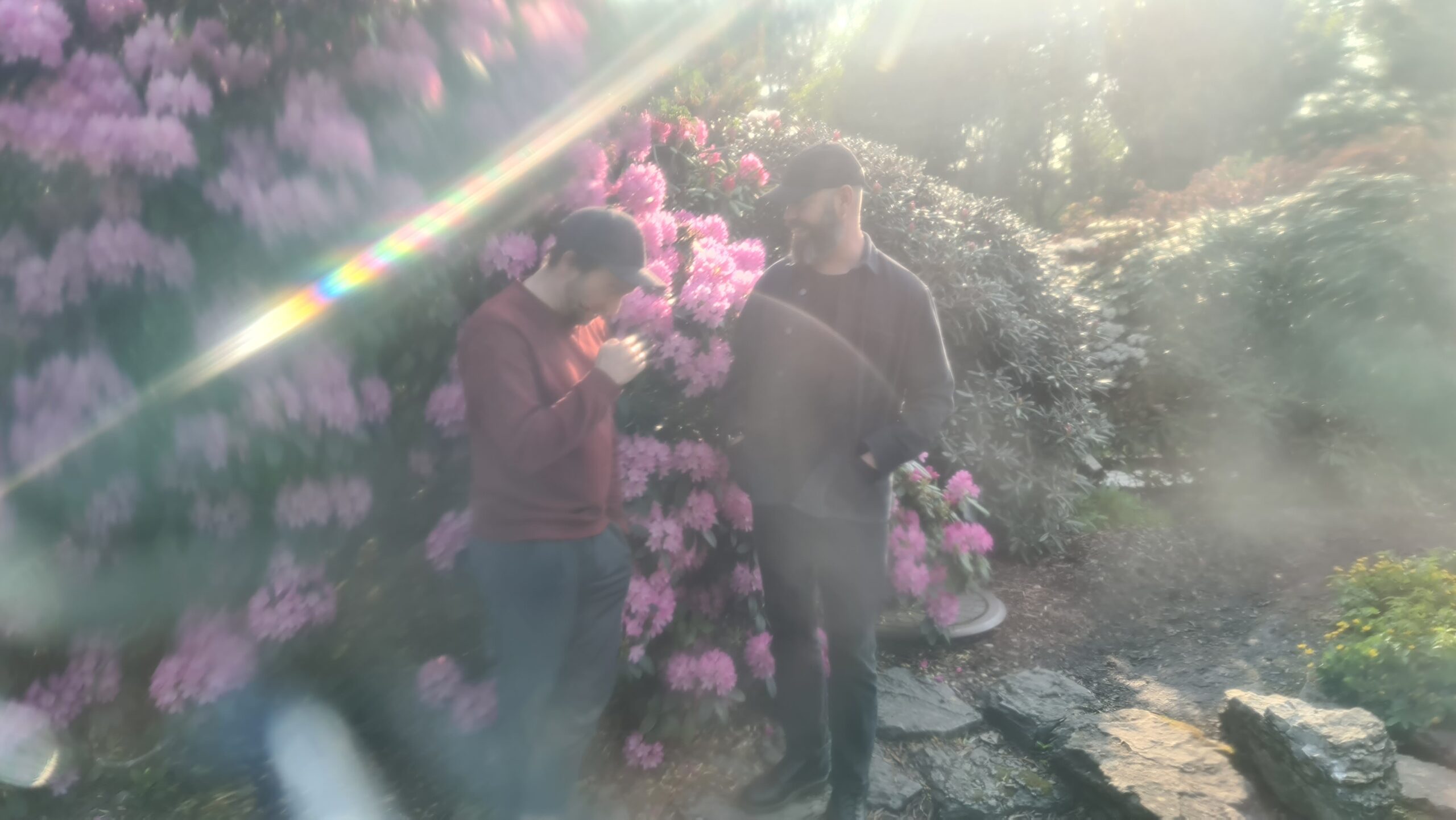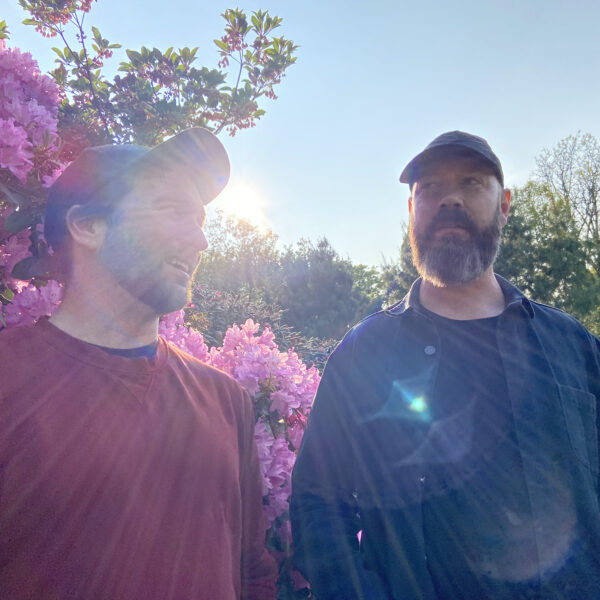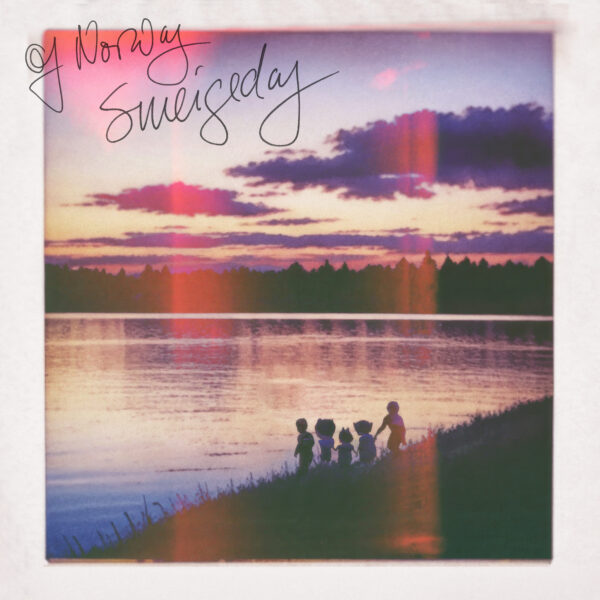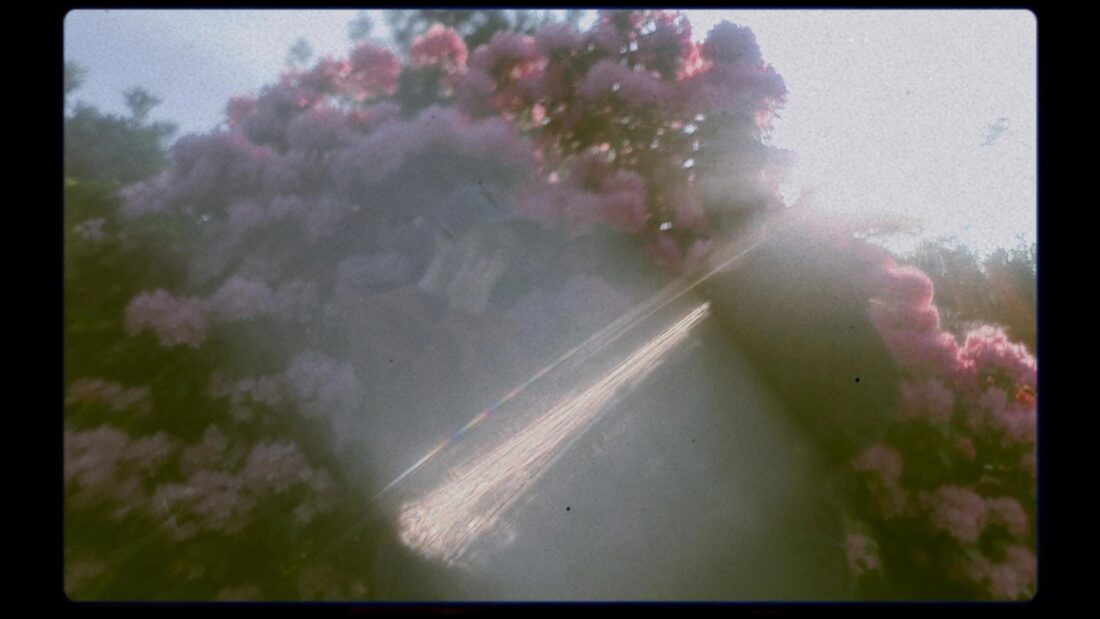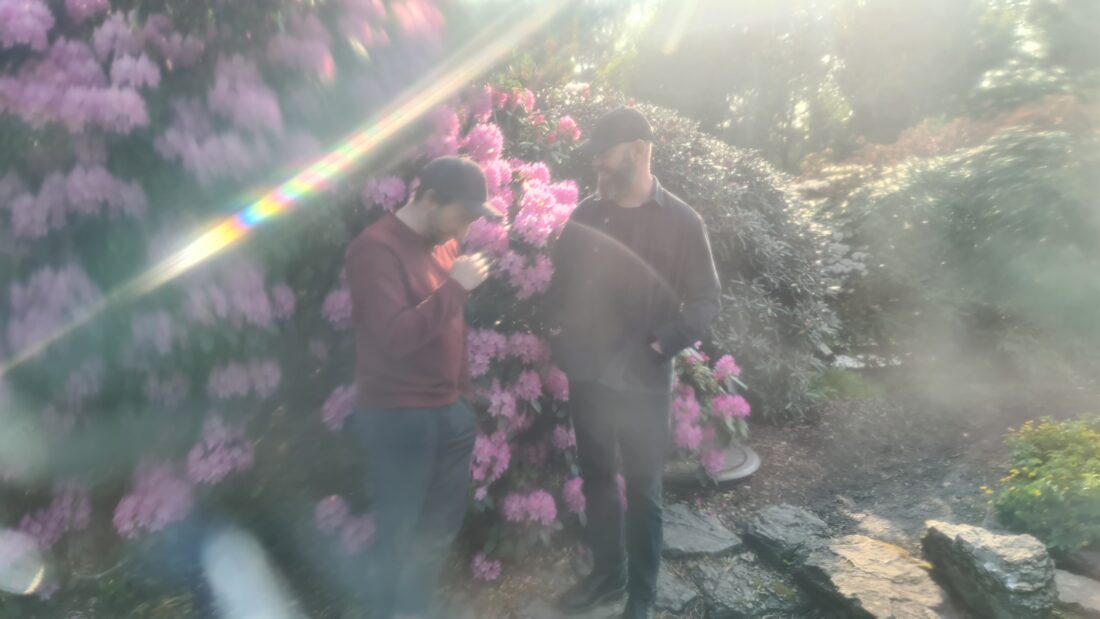Of Norway talk about their new album, their working process, some secret aliases and a very special live show that will follow their official release party at Jaeger.
It’s hard to define the appeal of Norwegian electronic music. It’s a melodic contingent; a love of vintage synthesisers and drum-machines; an eclectic musical history; and a brooding melancholy that’s as sweet as it is foreboding. At the best of times it’s only a couple of those things that distinguish Norway’ s artists, but for one group it’s all of those things and that’s why Of Norway live up to their name.
Their latest album stands testament to that. Smeigedag is no exercise in restraint either as Chris Lynch and and Vegard “lil” Wolf Dyvik tap into their shared history together to construct a forlorn ode to summer. Melodies dissociate in that familiar happy melancholy that doesn’t strain the patience, while progressive rhythms tap into some ancient ritualistic pulse. The racks go from the euphoric House exaltations of “Love” to the moody ambient embrace of “Second coming,” with melody and texture remaining at the forefront of their work.
It’s instantly familiar, not merely for its Norwegian connotations, but as a consistent thread between this latest and Of Norway’s previous records like “Accretion” and “The Loneliest Man in space.” The latter had been our last contact with the group before the pandemic (even though we learn that they’ve released another record since), and from that album’s electro-leaning affiliations to this latest record, the core of the group’s sonic signature has remained unchanged even as they drift into different musical regions.
After four albums and a host of EPs, Of Norway Chris and Vegrad haven’t evolved the sound as much as they’ve cemented it. They’ve enjoyed a healthy and productive relationship with Connaisseur records, releasing all their albums on that Offenbach-based outlet while releasing EPs and singles for the likes of Darkroom Dubs, Bedrock and Do not sit on the furniture. Oddly for a group called Of Norway, their music has been more successful outside of Norway even though Vegard and Chris have been fixtures in Oslo’s scene through institutions like iconoclastic and Kill your Ego.
As DJs Chris and Vegard continue to play around town and abroad on occasion, and as artists we’ve come to expect a regular release from Of Norway. Their history with electronic music in the scene goes back to the early 2000’s and there’s more to Of Norway than meets the eye, including a couple of secret aliases. This amongst other things piques our interest around Of Norway, and ahead of the official release of the album, we reach out to the group with some questions.
As the duo prepares for the official release party at Jaeger, we call Vegard and Chris to find they are currently working on a very special live show, and Chris’ phone is buzzing with guestlist requests…
Where are you at the moment?
Chris Lynch: We’re in the studio, working on the live set. We’ve just got booked to play Berghain so we’re a bit nervous.
O wow. That’s big news. Is this due to Smeigedag and is the live show going to be largely based around the new album?
Chris: Yes, it is. Andy Baumecker (Berghain resident and booker) really liked the promo that he got and he got in touch with us asking: “do you want to play the album plus other recent things that we made.”
Vegard “lil” Wolf Dyvik: There might be some older things, but it’s mostly the newer stuff.
Chris: It’s a slightly different sound to our earlier albums. It’s a little more dance floor…
Vegard: Is it?
Chris: Yes it is, if you compare it to the Accretion album. It’s a little more club friendly.
When you have something like Berghain coming up, do you take that context into consideration when preparing your live set or do you present the songs pretty much as they are from the album?
Vegard: I think we’re pretty true to our album. We don’t change our sound for clubs anywhere.
Chris: It’s more about the sequencing or the tracks we choose to play. If we play an open air space, you can play the more trancy stuff, or if we play a basement it’s more bass-heavy. If we have 20 tracks in a live set, we’ll only play 6 or 8 of them.
Vegard: The difference is we are preparing a lot of tracks and we have a system so we can just jump to any track we want. Which means, like a DJ, we don’t have to play our tracks in sequence. We won’t change the way the tracks sound.
And you are able to react to the audience as well, since you have twenty odd songs at your disposal?
Chris: Yes, and you can take the bassline of one track and put it into another song. Like if you were a DJ and you had like a hundred stems that you could just put in wherever. We’re not getting booked to play large stages, we’re still in the small clubs, so it makes sense to play something that fits in there.
Vegard: Also when we used to take a guitarist/ bass player with us, it was more like a concert and people would just stand and look at us. We want people to have a fun experience dancing, presenting our own music.
Chris: If there’s too much shit going on people are just standing, and you get a lot of guys scratching their beards.
Ok, we should probably talk about the reason for this interview; Smeigedag. It’s the first record in a couple of years for you and it seems like there are some disparities with this record and the Loneliest man in Space, which to me was more electro-leaning while this one is more straight…
Chris: Yes it’s more House-y. We don’t really plan stuff, it just happens.
Vegard: It’s kind of a corona-thing. A lot of the sketches were made during corona.
Chris: We just missed going out. We actually made another album between those two, which was made during covid. It was called the Soft Apocalypse, and it was more dark and ambient. It was a darker record and this one is a lighter record.
Vegard: We made most of it during summer.
Chris: I remember the label said; “ah you really missed summer,” didn’t you? It really came around quickly, around July.
Of this year? That’s a quick turnover.
Chris: Yes, I think it started out in May and we were done by the end of June.
Vegard: We have a very close relationship with Connaisseur. We sent a couple of tracks to Alex (Fitsch) and said; “maybe this could work as an EP.” And he was like; “actually maybe this could work as an album.”
Chris: So we thought; “guess we have to make some more music.”
Vegard: Whenever we make an album, with the exception of Accretion, which took ages, it’s two or three weeks and then we have most of it down.
Chris: That first album took absolute ages. We didn’t know what we were doing, it was years ago. We were maybe overthinking it.
Vegard: And now we have hundreds of sketches. Whenever we start a track, we just go through the library.
What is your working process like?
Chris: We get together twice a week religiously. We meet up at 18:00 every Tuesday and Wednesday and work till 21:00-ish. It’s almost like going to soccer practice, but it’s a lot more fun.
That’s disciplined. At what point do you realise a track is done and when do you recognise that they’ll work together on an album like Smeigedag?
Vegard: Well, we only release albums via Connaisseur. The label helps out with what goes on the album, to be honest.
Chris: Basically, we have a private folder on soundcloud and stuff everything in there. We do the first selection and then we send it to the label. Connaisseur is more like an old-school label in the way they are involved in everything from the sequence of the tracks to the length of them. New labels don’t invest so much time in it. It suits us well.
How many songs did you deliver for the label on this occasion?
Chris: This time we actually didn’t deliver enough. We actually had to make another one.
Vegard: There were a couple of tracks they didn’t want.
Chris: It started off as an EP with three or four tracks, and they asked to make it an album, and now it’s a mini-album. I still call it an album but the label calls it a mini-album.
Did you guys have an idea in terms of sound when you were still working on it as an EP, or was it just that it coalesced around a sound because you happened to be working on all the tracks in the same kind of timeframe?
Chris: I think it’s mostly the timeframe.
Vegard: When we planned it as an EP, we took three of the finished songs, because we thought they might fit together. It was more like we had some tracks that fit together and not that we went for a sound.
Chris: It’s hard to go for a sound.
Vegard: We don’t know what we want to do.
Chris: Sometimes these tracks are in their sixth or seventh version and the starting point is something completely different.
What ties it all together for you on this album?
Chris: Euphoric warmth, with a classic Norwegian underlying melancholy which has a dark depressing edge in there.
Vegard: Some of the sketches in there were from when I lost my cat.
Chris: We have another EP coming out on Bedrock (John Digweed’s label) and they are basically homages to Vegard’s cat.
Were you influenced by any tangible thing at the time, except the fact that Vegard’s cat died?
Vegard: When I started the sketches I wanted everything to be melancholic and warm. For Christmas one year, I got digitised video tapes from when I was little.
Chris: Me as well.
Vegard: So on the cover of the album, the two little kids, that’s me and Chris.
Chris: All the canvas videos on Spotify, all that stuff is from our own home movies from the late 70’s early 80’s.
Vegard: That kind of inspired me.
Chris: The fuzziness and graininess of the video and the way the sun bleeds into the photograph.
Vegard: You know, when life was good. (laughs)
Chris: You know The Doors track, Summer is almost gone. Not specifically the track, but the feeling.
What’s interesting is that when I first listened to the record I immediately had this sense of haziness that you talk about, like an old polaroid captured in sound. But I didn’t have the words to describe it until you just said it now.
Chris: Yes, we actually managed to find it now while talking to you. It all hangs together, from the video to the press photos and the cover and the sound, it’s quite cohesive. We’ve managed to get hold of some thirty summer postcards from the 70’s and they are going to be in the limited edition vinyl album.
Vegard: A summer greeting from us.
Have you guys known each other for that long?
Chris: We’ve only known each other since the early 2000’s and we started making music together since 2006. I did a radio show at Radio Tellus back in the days, and Vegard was there playing some times. We were both DJs and knew each other through that. Oslo was quite small and the DJ scene was quite small back then.
And then you played together at iconoclastic?
Chris: Yes I started playing with Deadswan and then Vegard joined us later, We were a trio for some years. So, we’ve been doing different projects together, but the Of Norway project has almost always been House-based music.
Vegard: It’s always been quite emotional.
I was listening to one of our early records, Karpathian Thirst in preparation for this interview, and that Of Norway mood is there from the start. Then again, do you feel your music has evolved?
Chris: Definitely. I can’t really say how, it just has.
Vegard: I think, we’ve been doing this so long now, and we’ve been through so many different things, that we have so many reference points that we can put this together.
Chris: Something that’s nice about getting older, is that you can step back and see the big picture. When you’re young and get into something like minimal Techno, then everything is about that and you can’t judge anything else, because you think everything else is shit. Like we like to say in Norway, you’ve got to get out of the duck pond. You get more oversight.
I remember iconoclastic happening around the same time you started Of Norway. It was at the end of the electroclash era, so there was still this melting pot of various genres and styles…
Chris: It was the end of electroclash and the beginning of the blog-house scene. It was very eclectic, so you took stuff from all over the musical map and popped it in there.
Vegard: It was very energetic and rough.
Chris: And Punky in a way.
Exactly and when I first heard of Norway it didn’t sound like the offspring of any of that, but something completely different again.
Chris: That was just one of many things. At that time we both lived as DJs. I played indie music, and I played Drum n Bass at Kill your Ego and Sykemekanico. I also played old-school Hip Hop.
Vegard: I was more into US-House and Garage.
Chris: I realise it’s quite confusing, because we’ve always had the same DJ names and you never know what you’re going to get. Musically we’ve been all over the place. I think reference-wise, we can be influenced by absolutely everything; even a sound in a Nick Cave record.
Do all these eclectic influences feed into this one project?
Vegard: We’ve grown a bit wiser now, so we’ve chosen some monikers.
Chris: We do produce music under different names, so we have three names that we release music under.
What are the other two?
Chris: They’re both secrets. One of them has released a lot of music. Now it’s easier, if something sounds like Of Norway, we’ll just continue as Of Norway. We enjoy being secretive, because we’re men in our mid forties, and if people knew that they probably wouldn’t sign us.
Tell me about your relationship with the label Connaisseur and how that started.
Chris: Vegard had the first contact with Connaisseur.
Vegard: It was a very long time ago. I don’t remember how we got in touch, maybe Myspace. I know why they signed us. It was because we were called Of Norway, and we looked like a black metal band.
Chris: Our press photos were in black and white and high-contrast, and we had this hand drawn necro logo. It was completely different from what you hear musically and that caught their interest.
Vegard: The tracks had titles like Karpatian Thirst.
Chris: Yeah, they were all metal names. After that, we were included on the compilation, and we thought that’s it. Then they invited us to play a place called Bar 25 in Berlin, which was this hedonistic, legendary club in Berlin. After that the ball started rolling with Connaisseur and they signed more and more stuff.
Vegard: They are also friends now. We even made a track for his (Alex) daughter.
Chris: Song for Eva is dedicated to his daughter. All proceedings go to her educational fund.
I assume they were based in Offenbach back then. How did you hear about Connaisseur recording in the first place?
Vegard: I had some records from them.
Chris: They had a massive hit, years ago with Patrick Chardronnet called “Eve by Day.” Soundwise, we’ve never sounded like anything else on the label.
Vegard: We’ve never sounded like anything on any of the labels we’re signed with.
Chris: Everytime we get signed to a label, we think; “why the hell did you sign us?” (both laugh) We don’t fit in anywhere.
Vegard: So therefore we fit in everywhere.
That’s a testament to your music. It can reach a large audience. Do you feel that your music translates better outside Norway than in Norway?
Chris: There’s no reason for it, but I definitely think so. It’s definitely Germany and the US that are the biggest territories for us. We’ve had a few releases on an American label called Do not sit on the furniture.
Vegard: I think it’s because we’re not so actively part of the Norwegian scene as DJs anymore.
Chris: It’s not been on purpose, it’s just happened.
After this record and the gig in berghain, what else is on the horizon for Of Norway?
Chris: We’re releasing a record for Darkroom dubs. We’ve got some stuff on Bedrock. We have something on a label called Sum over histories (Frankey and Sandrino). Otherwise on the DJing and live side, we were unfortunate after corona, and lost our agent. We’re free agents so we’re not getting many gigs at the moment.
Hopefully having Berghain on the CV will help, hopefully…
Words: Mischa Mathys

